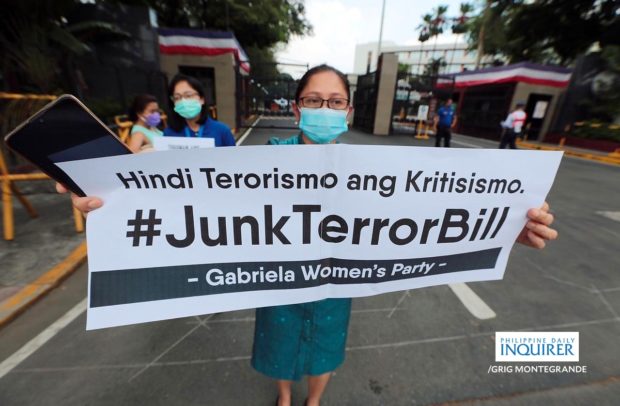13 provisions of anti-terror law unconstitutional — FEU law profs

Progressive groups staged a protest and noise barrage outside the House of Representatives on Wednesday, June 3 to demand the scrapping of the anti-terrorism bill which Congress approved in its 2nd reading on Tuesday. INQUIRER FILE PHOTO / GRIG C. MONTEGRANDE
MANILA, Philippines — Law professors from the Far Eastern University led by Dean Mel Sta. Maria has questioned before the Supreme Court the constitutionality of 13 provisions of Republic Act 11479 or the Anti-Terrorism Act of 2020.
In their 84-page petition, petitioners said the 13 provisions of the law are, on their face, in gross violation of the 1987 Constitution and prevailing jurisprudence.
“Their implementation shall have a serious and dangerous chilling effect on the citizens and other persons’ freedom of expression, speech and the press, as well as other important fundamental rights under the 1987 Constitution, such as but not limited to substantial and procedural due process, the right to privacy, freedom of association, and academic freedom,” petitioners said.
The 13 provisions, they said, can be facially challenged because it will produce a “chilling effect” and result in the prior restraint of freedom of speech, of expression, of the press, of association, and of assembly.
Section 4 of the law defines Terrorism which petitioner said provides for an “overly broad definition to cover traditionally recognized and protected forms of expression against government shortcomings and excess.”
Article continues after this advertisementPetitioners said the assailed provision “implies that all speeches may be treated as within the punishable acts defined under the Act unless it is shown that no intent to cause harm…”
Article continues after this advertisementEnormous powers
Part of the questioned provisions is the creation of the Anti-Terrorism Council (ATC) and granting it enormous powers like determining who are terrorists, and to detain them of up tp 24 hours without court warrants.
“In the pursuit of this mandate, the ATC has been given a plethora of powers and functions, including but not limited to the power to, among others, “grant monetary rewards and other incentives to informers who give vital information leading to the apprehension, arrest, detention, prosecution, and conviction of any persons found guilty of any of the acts defined and penalized under Sections 4, 5, 6, 7, 8, 9, 10, 11 and 12 of the Act, ” the petition read.
“It indubitably gives law enforcement agents and military personnel unbridled discretion to arbitrarily flex their muscle in carrying out its provisions merely on the basis of their ‘suspicion,’ intuition or understanding,” petitioners said.
“If this law will be allowed to take effect, it will legitimize wrongdoings, allow transgressions to constitutional liberties, and give license for wrongdoers to act with impunity,” they added.
‘Chilling effect’
Sections 5 to 12 they said definition of ancillary or secondary offenses, including inciting to commit terrorism, are patently vague and overbroad.
“Said provisions create a ‘chilling effect’ that would constitute prior restraint to, and stifle the free exercise of, such fundamental freedoms.”
Petitioners added that Sections 25 and 29 legitimizes warrantless arrests based on mere suspicion.
Said sections, they said “completely disregard and violate Article III, Section 2 of the fundamental law by supplanting the Constitutional requirements before an individual may be arrested and deprived of liberty, namely a judicially issued warrant of arrest and the stringent requisites for a lawful warrantless arrest.”
“The threat of arrest without a judicial warrant and prolonged detention, according to the FEU Law Professors, would be more than chilling enough to stifle, suppress, if not totally snuff out, any fire, flame, or even flicker, of indignation or protest against government corruption, oppression and abuse.”
This is the second petition against the Anti-Terrorism Law filed Monday before the Supreme Court.